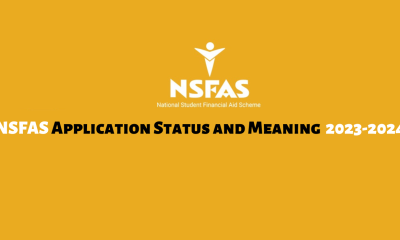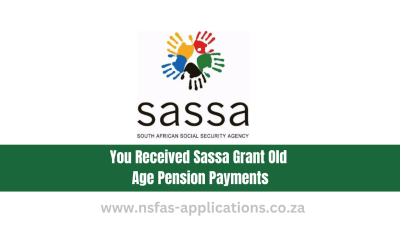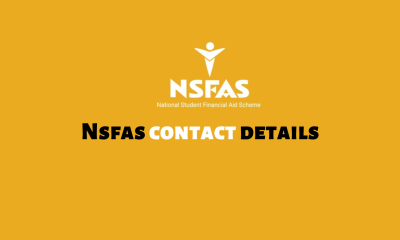NSFAS News
How to Fix These Mistakes for Your Next NSFAS Application or Appeal

How to Fix These Mistakes for Your Next NSFAS Application or Appeal? For many South African students, securing financial aid through the National Student Financial Aid Scheme (NSFAS) can mean the difference between accessing higher education or missing out. However, it’s not uncommon for first-time applicants to be rejected sometimes for avoidable mistakes. If you recently received a rejection, don’t lose hope. Understanding common NSFAS application mistakes and how to correct them can significantly boost your chances during your next attempt or appeal.
Why NSFAS Applications Get Rejected
Applying for student financial aid in South Africa can be tricky, especially if you’re not fully familiar with the NSFAS application process. Some of the most common reasons for rejection include:
- Incomplete or inaccurate documentation
- Mismatched personal information
- Exceeding the household income threshold
- Missing academic requirements
- Failure to submit on time
Each of these factors can lead to delays, or worse, an outright rejection. Understanding them in detail is the first step toward a successful NSFAS journey.
NSFAS Application Mistakes and How to Fix Them
1. Incomplete or Incorrect Documentation
One of the biggest causes of rejection is failing to upload the correct supporting documents. NSFAS requires certified copies of your ID, proof of income for your household, academic transcripts, and sometimes affidavits.
How to Fix It: Before you start your next application, create a checklist. Double-check that all documents are certified (not older than three months) and are clearly legible. Upload them in the correct file format and ensure they are labelled properly.
2. Personal Information Doesn’t Match
Your information on the application form must match exactly with your official documents. Even minor differences, like spelling mistakes or wrong ID numbers, can cause your application to be flagged.
How to Fix It: Always use your full legal names as they appear on your ID. If there are any discrepancies, get them corrected at the Department of Home Affairs before applying.
3. Household Income Errors
NSFAS is aimed at helping financially needy students. If the combined household income is incorrectly reported as higher than the threshold, you will be rejected.
How to Fix It: Accurately declare all sources of income. If there’s confusion about what needs to be included, consult the NSFAS guidelines or speak to an official representative.
4. Academic Ineligibility
Students must meet certain academic requirements to qualify for funding. If you failed subjects or did not meet the minimum pass rate, your application could be unsuccessful.
How to Fix It: Work towards improving your academic performance. You can also appeal and provide evidence of any personal circumstances (such as illness or family emergencies) that may have affected your grades.
5. Late or Missed Deadlines
NSFAS strictly adheres to their submission timelines. Missing a deadline almost guarantees rejection.
How to Fix It: Set reminders and apply early. Monitor the official NSFAS website and social media channels for important announcements and deadline updates.
How to Appeal a Rejected NSFAS Application
If your NSFAS application has been rejected, you have the right to appeal. Here’s how you can give yourself the best chance:
Step 1: Understand the Reason for Rejection
Before appealing, read the rejection letter carefully. Identify the exact reason your application was unsuccessful. This will guide you in preparing a strong appeal.
Step 2: Gather Evidence
Supporting documents are critical during an appeal. If your household income changed recently, include updated payslips or affidavits. If poor academic performance was due to illness, attach medical certificates.
Step 3: Write a Detailed Appeal Letter
Your appeal letter should be professional, honest, and detailed. Clearly explain your situation, focusing on why you believe the rejection should be reconsidered.
Step 4: Submit Your Appeal on Time
Just like the initial application, the appeal must be submitted before the stated deadline. Late appeals will not be considered.
-

 blog1 year ago
blog1 year agoNSFAS Application Status and Meaning 2023-2024
-

 sassa7 months ago
sassa7 months agoYou Can Now Apply for a Basic Income Grant of R999
-

 sassa7 months ago
sassa7 months agoFinally New Grant of R999 for Basic Income Introduced
-

 sassa7 months ago
sassa7 months agoGood News New Grant of R999 for Basic Income Introduced
-

 sassa1 year ago
sassa1 year agoYou Received Sassa Grant Old Age Pension Payments
-

 blog7 months ago
blog7 months agoNsfas contact details – How to Contact NSFAS 2025-2026
-

 sassa7 months ago
sassa7 months agoNew Verification Method for SRD R350 Grants From Sassa
-

 NSFAS News5 months ago
NSFAS News5 months agoRegistering your accommodation properties with NSFAS
